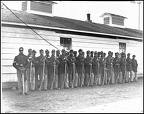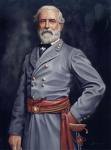The
Civil War knew some of the best leaders and generals of all time. There were political leaders, but also leaders on the battlefield
that greatly impacted the war and each battle individually.
"We
feel that our cause is just and holy; we protest solemnly in the face of mankind that we desire peace at any sacrifice save
that of honour and independence; we ask no conquest, no aggrandizement, no concession of any kind from the States with which
we were lately confederated; all we ask is to be let alone; that those who never held power over us shall not now attempt
our subjugation by arms." 'President Jefferson Davis - 29 April 1861.
Jefferson
Davis was elected provisional President of the Confederate States by the provisional Congress on February 18, 1861. He was
elected to the office by popular vote the same year for a 6-year term and was inaugurated in Richmond, Virginia, the capital of the Confederacy, on February 22, 1862. Davis
had both a military and political history with his involvement in the Mexican War, and his previous servitude as a US Congressman (http://americancivilwar.com/south/jeffdavi.html).
Davis had a tougher time in the war compared to Union leader Abraham Lincoln. While Lincoln
was blessed with an established governmental structure, a standing army, healthy financial resources, and established diplomatic
relations with nations of Europe, Davis had to build a government
from scratch. Davis failed to raise sufficient money to fight
the Civil War and could not gain recognition or help for the Confederacy from foreign governments. Davis was responsible for the raising of the strong Confederate armies, the appointment of
General Robert E. Lee as the Commander of the Army of Virginia, and the encouragement of industrial enterprise throughout
the South (http://www.civilwarhome.com/jdavisbio.htm).
Even
in 1865, Jefferson Davis still hoped the South would be able to achieve its goal of independence, but he finally realized
that defeat was inevitable and fled Richmond.
Much
like the Southerners, the Northerners needed a convincing reason to fight out the prolonged sacrifice of the War. The struggle
was a distant one, with most of the fighting taking place on Southern soil far from their own homes. Abraham Lincoln and other
Northern leaders secured support by convincing their people of the importance of preserving the Union.
Lincoln framed the war as more than just a military conquest.
He explained that the struggle was not just for today, but for the future. Lincoln
saw the conflict in terms of its affect on everyone (http://americancivilwar.com/north/abe_lincoln.html).
Lincoln handled disagreement better than
that of Davis. He viewed himself as a man of the people and
made himself available to them. Lincoln never let the world
forget that the Civil War involved an even larger issue. This he stated most movingly in dedicating the military cemetery
at Gettysburg: "That we here highly resolve that these dead shall not have died in vain--that this nation, under God, shall
have a new birth of freedom--and that government of the people, by the people, for the people, shall not perish from the earth."
Besides
the Presidents of the Confederacy and Union, there were many leaders that led specifically
on the battlefield. One of the most famous was Confederate General Robert E. Lee.
When
General Joseph E. Johnston was badly wounded in a clash at Seven Pines, President Davis replaced him with General Robert E.
Lee, who renamed the forces under his command the Army of Northern Virginia. Lee's father had been a Revolutionary War hero
and Lee was accustomed to power and command. Lee was masked a gambler's disposition.
A fellow officer
once stated, “His name might be Audacity. He will take more chances, and take them quicker than any other general in
this country." Under Lee's leadership, the Confederacy's defensive strategy underwent an important shift.
In
the Seven Days' Battles, Lee seized the initiative and attacked McClellan's right flank on June 25, 1862. It was the deadliest
week of the war so far and although Lee had saved Richmond,
his troops had suffered frightfully. He lost one-fourth of his 80,000 man army but remained convinced of the wisdom of his
offensive-defensive strategy. Lee believed that better coordination would have reduced casualties and inflicted greater damage
to the enemy (http://www.civilwarhome.com/leebio.htm).
Lee saved Richmond again in the Second Battle of Bull Run. Lee's army sustained
fewer losses and kept the Federals moving beyond the positions they held in Virginia
at the start of the war. Lee and his army were quickly developing a reputation for invincibility. Lee next contemplated a
bold move; a thrust into Northern territory to bring conflict
to the North and push Northerners' rising hostility to the war. The bold plan, he believed, would end the war and secure Southern
independence, or quicken an otherwise inevitable Union victory.
The Battle of Antietam
halted Lee's advance into the North and eliminated the Confederacy's chance for diplomatic recognition. It was the bloodiest
single day of fighting in American history and about 2,700 Confederates died on the battlefield. Lee's troops limped back
across the Potomac into Virginia.
At Chancellorsville
Lee pulled off another stunning victory, but at an unbearably high cost. He lost some 13,000 men, more than the Confederates
could afford. Lee also lost Stonewall Jackson at Chancellorsville. Jackson was known for his lightning strikes at the enemy and his understanding of the tactics
of modern warfare. Jackson had helped Lee to win some of the
Confederacy's most stunning victories in 1862.
Lee
made his fateful error on July 3, the third day of the Battle at Gettysburg. He believed that the center of Meade's line was weak, and ordered an all-out
assault against it. Meade was fully prepared for this assault. When Union guns went silent, the Confederates began a charge
led by General George Pickett. As the Confederates marched, the Union artillery opened fire again, tearing apart the charging
Southerners. Lee had violated his own rule to never order a frontal assault. Meade allowed Lee to withdraw into Maryland and cross the Potomac to Virginia.
The Confederates suffered 28,000 casualties.








